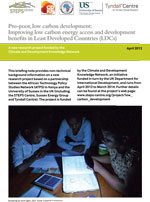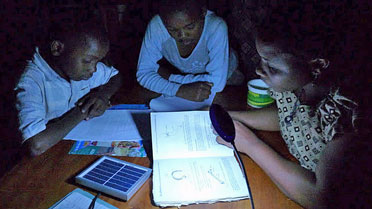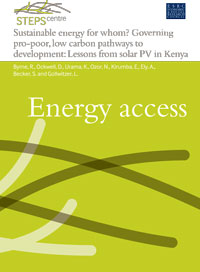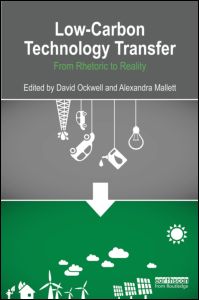Sustainable energy technologies could contribute significantly to human development and economic growth in low-income countries. What are the key policy lessons from historical research explaining the success of the market for off-grid solar home systems and solar portable lights in Kenya?
Pro-poor, low carbon development: Improving low carbon energy access and development benefits in Least Developed Countries
Overview | Publications | Media | Updates
This project was a partnership between the African Technology Policy Studies Network in Kenya and the University of Sussex in the UK (including the STEPS Centre, Sussex Energy Group and Tyndall Centre). It was funded by the Climate and Development Knowledge Network (an initiative which is in turn funded by the UK Department for International Development, DFID). The project ran from April 2012 to March 2014.
Overview
The project aimed to inform the development of Climate Innovation Centres in various developing countries by analysing the history of, and actors involved in, the adoption of solar home systems in Kenya. The objective was to improve the ability of policy to facilitate the transfer and uptake of low carbon technologies in developing countries, and to do so in ways that can assist in their economic development. Especially challenging but of critical importance to this economic development, the project aimed to identify ways in which low carbon technologies can benefit poor people by improving access to modern energy services.
The project brings to bear innovative theory which builds on the STEPS Centre’s Pathways Approach to bridge relevant insights from academic literature in the fields of both innovation studies and socio-technical transitions. For more information on the theoretical background to the project see the STEPS Centre Energy Briefing and associated Working Paper. This project is part of the STEPS Centre’s broader Energy and Climate Change research domain.
For further information please contact David Ockwell or Rob Byrne.
Project team, ATPS, Kenya: Nicholas Ozor, Kevin Urama
Project team, Sussex University, UK: Sarah Becker, Rob Byrne, David Ockwell
Publications
Working Papers
- Sustainable energy for whom? Governing pro-poor, low carbon
 pathways to development: Lessons from solar PV in Kenya By Rob Byrne, David Ockwell, Kevin Urama, Dr Nicholas Ozor, Edith Kirumba, Adrian Ely, Sarah Becker, Lorenz Gollwitzer (PDF 2mb)
pathways to development: Lessons from solar PV in Kenya By Rob Byrne, David Ockwell, Kevin Urama, Dr Nicholas Ozor, Edith Kirumba, Adrian Ely, Sarah Becker, Lorenz Gollwitzer (PDF 2mb) - Financing Sustainable Energy for All:Pay-as-you-go vs. traditional solar finance approaches in Kenya By Paula Rolffs, Rob Byrne and David Ockwell (PDF 1.2mb)
- Gender and the construction of identity within climate technology innovation in Kenya By Mipsie Marshall, Rob Byrne and David Ockwell (PDF 707kb)
- Energy pathways in low-carbon development By Rob Byrne, Adrian Smith, Jim Watson and David Ockwell (PDF 3.96mb). See also Energy pathways briefing
Briefings
Project briefing 2 – Summary of policy lessons from the project (PDF 160kb)
- English: Low carbon energy and development in low-income countries
- Kiswahili: Nishati ya kaboni ndogo na maendeleo katika nchi zenye kipato cha chini
Project briefing 1 – A short, non-technical  briefing about this project, its aims, rationale and approach (PDF 297kb)
briefing about this project, its aims, rationale and approach (PDF 297kb)
- English: Pro-poor low carbon development project
- Kiswahili: Kuendeleza kwa kaboni pungufu kwa ajili ya jamaa zilizo maskini. Kuboresha upatikanaji wa nishati ya kaboni iliyopunguzwa, hali kadhalika, kuendeleza faida katika nchi zenye maendeleo ya chini zaidi (LDCs).
Energy pathways briefing – A short, easy-to-read briefing to accompany the Energy pathways in low-carbon development working paper. (PDF 219kb)
- English: Energy pathways in low-carbon development
- Kiswahili: Njia za Nishati katika Ustawi wenye Kaboni-Kidogo
Political economy briefing
- The political economy of low carbon energy in Kenya – Climate Compatible Development in Kenya (PDF 880kb) By Peter Newell, Jon Philips and Ana Pueyo, based on a study in collaboration with the African Technology Policy Studies Network & funded by CDKN. Is it possible for Kenya to simultaneously tackle energy poverty, contribute to climate change mitigation and reduce exposure to climate vulnerability
Innovation Histories
- Innovation Histories briefing (PDF 226kb)
Books
- Low-Carbon Technology Transfer From Rhetoric to Reality Edited by David G. Ockwell, Alexandra Mallett. Low carbon technology transfer to developing countries has been both a lynchpin of, and a key stumbling block to a global deal on climate change. This book brings together for the first time in one place the work of some of the world’s leading contemporary researchers in this field.
Reports
- Innovation Histories report (PDF 1,136kb)
Methods
- Methods case study – methods used in the project
- Methods vignette – outline of Innovation Histories method
Media
- Kevin Urama, executive director of the African Technology Policy Studies Network (ATPS) and Adrian Ely, STEPS Centre head of impact and engagement, talk about social innovations and prosperous societies to Kenyan TV programme, The GMK Show, June 2013.
- FEATURE: Market forces not the main driver of solar technology uptake in Kenya CDKN website
Project resources
February 2013 presentation
Sustainable energy for whom? Governing pro-poor pathways to low carbon energy for development
David Ockwell and Robert Byrne (University of Sussex/ STEPS Centre) gave this presentation – co-authored with Kevin Urama (ATPS) – at King’s College London on 25 February 2014.
October 2013 – resources
- Presentation: Beyond hardware financing: Pro-poor pathways to low carbon development, Dr David Ockwell & Dr Rob Byrne, presented at UAE October 2013
- Discussion paper: Building pathways of pro-poor energy access: PV-powered electricity services in Kenya, Dr David Ockwell and Dr Rob Byrne, presented at PEGNet, University of Copenhagen, October 17-18, 2013 (pdf 973kb)
-
Discussion paper: Low carbon development, poverty reduction and innovation system building, Rob Byrne and David Ockwell, presented at Globelics 2013 (pdf 539kb)
June 2013 – “Innovation Histories” workshop
In June 2013 the project ran an “Innovation Histories” workshop in Nairobi, Kenya. The aim was to convene stakeholders to contribute their knowledge and experiences to help understand the factors that enabled and constrained the relatively successful uptake of Solar Home Systems in Kenya. Together with post-workshop interviews, this was used to build up a detailed picture of the key events, actors and actions that facilitated SHS uptake in Kenya.
In the first instance, the research aimed to provide insights to inform the working of the new Climate Innovation Centre in Kenya. More broadly, findings from the project fed into the implementation of Kenya’s National Climate Change Response Strategy and the Kenya Vision 2030. These insights were also brought to bear on other centre-based approaches (such as the UNFCCC Climate Technology Centre and Network) that aim to maximize development benefits from the wider uptake of low carbon technologies in lower income developing countries.
- Innovation Histories briefing (PDF 226kb)
- Innovation Histories report Full report from the workshop (PDF 1,136kb)
- Photos from the Innovation Histories workshop
- Watch a TV interview with Kevin Urama of ATPS and Adrian Ely of the STEPS Centre speaking about social innovations on Kenyan TV programme The GMK Show, June 2013 (YouTube)
Autumn / Winter 2012-13 (2 October 2012 – 1 January 2013)
ATPS forged ahead with project publicity during autumn 2012, issuing two press releases in the run up to, and following, the influential ATPS Annual Conference and workshops at the Africa Union Commission Headquarters in Addis Ababa, Ethiopia. Keynote presentations to 150 delegates were given by the project’s Kevin Urama (ATPS) and Rob Byrne (Sussex) and our research featured in both plenary discussions and a project-specific parallel session. A dedicated one day project workshop was run to coincide with the ATPS conference, allowing us to convene an exceptional group of high profile policy makers from across Africa.
The project was promoted at two policy conferences this quarter. Rob Byrne attended the UN climate change conference COP 18 in Doha to discuss the project and distribute project materials including 150 policy briefs from a stall. Rob also presented the project at a COP side event organised with the Energy Centre of the Netherlands. Thirty people specifically targeted for their interest and influence in centre-based approaches to technology transfer and/or low carbon development attended the session. Kevin Urama also promoted the project at an IPCC-organised pre-event in the run-up to the Africa development Forum VIII in Addis Ababa.
The project featured at two academic conferences during this period, with David Ockwell chairing a session at the Rethinking Climate Change, Conflict and Security conference at the University of Sussex and Kevin Urama giving an invited keynote speech in the US, organised by the Woodrow Wilson Centre for international Scholars. Importantly, Kevin was invited by the Africa Union Commission to draft a chapter of the Comprehensive African Strategy on Climate Change (Low carbon Growth Path and Climate Change) on “Energy and Africa’s Challenges to Assume a Low Carbon Growth”.
Meanwhile, more media and online promotion was undertaken both in Kenya and the UK through ATPS and the STEPS Centre.
September 2012 – Low Carbon Energy for Development Network (LCEDN)
The second international LCEDN workshop – Transitions to low carbon energy systems: which pathways to energy access for all? – took place at the University of Sussex, UK on the 10-11 September 2012. Kevin Urama, executive director of ATPS, the partner for the Pro-poor low carbon development project, gave the keynote speech.
Summer/Autumn 2012 (15 August 2012 – 1 October 2012)
The second Low Carbon Energy for Development Network conference provided a perfect platform to present the project to 85 delegates from across the global South and North, including policy makers, practitioners and academics. Kevin Urama, executive director of ATPS and Kenyan lead on the project, gave the keynote conference speech at the University of Sussex event. This publication of the project’s first book chapter – Low Carbon Development: The Need to Go Beyond Technology Transfer – came during this period, in the new Routledge book, Low Carbon Technology Transfer: From Rhetoric to Reality, edited by David Ockwell and Alexandra Mallett. Three important policy engagement activities were undertaken too, to present and discuss project ideas: with senior African Development Bank (AfDB) staff as part of a training programme on low carbon technology transfer and at two separate meetings to discuss project and emerging Climate Innovation Centres initiatives across Africa, with AfDB technical experts and Leanne Jones of the UK Department for International Development.
Spring/Summer 2012 (1 April 2012 – 13 August 2012)
The project went public with news announcements on the Kenyan media – live on KBC Television and KBC English Service Radio – and via the Sussex Energy Group and Tyndall Centre newsletters. A project awareness-raising piece in Guardian’s Global Development site highlighted the issues framing our project while a new project web page was launched on the STEPS Centre website, linked to from the ATPS site. A formal UK project launch came at the Low Carbon Energy for Development Network’s inaugural conference, to maximise attention from the many relevant NGOs, policy makers and academics in attendance. The project was also presented and peer reviewed at seminars hosted by both the Sussex Energy Group and the STEPS Centre, the latter attended by external researchers. A first policy briefing note from the project was published and circulated to targeted audiences.



